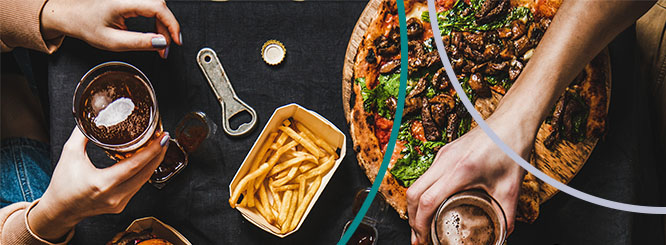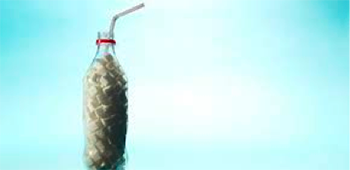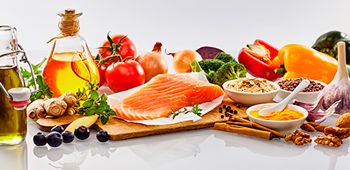
In a world that’s becoming increasingly saturated with food, it is difficult to make the best food choices. There are thousands of products on the shelves that are advertised as healthy, but they are far from it. Because of the recent interest people have in improving their eating habits, food manufacturers have taken it upon themselves to sell their products as “light”, “natural”, or “low-calorie”.
Of course, these labels do not guarantee that what you’re consuming is exactly what it’s selling and most of the time we end up eating more processed foods and drinks. If you want to learn more about the ingredients and nutrients in your food, we invite you to read this article about food labels.
There’s this notion that equates calories to something bad, something you should avoid, but aside from water or other artificial sweeteners, everything has calories and we should come to terms that we need them for energy. A balanced calorie intake in a healthy diet can help your metabolism and ensure your body has enough energy to develop and function properly. The calorie amount you need depends on your age, gender, and physical activity regime; if you’re not sure how to calculate it, contact a licensed nutritionist to develop a health plan that’s right for you.
However, not all calories are good for you. Aside from the unregulated consumption of “normal calories”, there are foods that are mainly composed of sugar or certain fats that do not provide the necessary nutrients to the body. What we have here are empty calories and if they’re consumed in large amounts, they will have a negative impact on our health.
At LIMARP®, we want our patients to have all the information they need to lead a healthy lifestyle and our team of doctors can guide you in finding the best diet plan to meet your goals. In this article, we’ll discuss empty calories, what they are, how to identify them, and how to best avoid them.
What’s an Empty Calorie?
Empty calories, to begin with, do not equal a low calorie count. There are foods, such as fruits and vegetables, that are low in calories, but provide other minerals and nutrients the body needs to function properly. When we read that a product mostly contains empty calories, it’s because they have almost nothing else, aside from high levels of saturated and trans fats, cholesterol, and sugar. This means that the food composed of empty calories has low nutrient density and it does not contribute enough energy to the body.
Food with empty calories can provide you with immediate energy, but they do not provide more nutritional benefits; this means that the calories that are not used for energy are stored as fat on the body, leading to weight gain problems. Another problem that may arise is nutrient deficiency; studies have shown that people whose diets are high on sugar and alcohol tend to be low on magnesium, zinc, and vitamin A, C, E, and D.
What makes empty calories dangerous to our health is that your body digests them quickly and the feeling of fullness doesn’t last long, prompting you to consume more calories than you need in a day. Foods with empty calories can also be addictive and lead to excessive eating, increased weight gain, and more serious problems such as blood sugar spikes, and inflammation that can lead to diabetes and heart disease.
Where Can We Find Empty Calories?
If certain foods do not contain nutrients or if the calories from the sugars and fats outweigh the nutrient count, they’re considered to be sources of empty calories. You can be able to distinguish this by reading the food labels on the packages. Up next, we’ll give you a list of food and drink groups that contain mostly empty calories:
- Sugar: Cakes, candies, cookies, soft drinks, sweet beverages, or anything containing high-fructose syrup.
- Fat: Deep fried and processed foods, potato chips, and other foods high on oil.
- Alcohol: Beer, wine, liquor, and other alcoholic beverages.
Unless you’re following a strict diet, a small amount of empty calorie foods is not bad. However, if you’re still wondering if consuming these foods is right for you, contact a dietitian to see if they can somehow be incorporated into your diet in a limited way.
What Can Be Done To Avoid Empty Calories?
People tend to consume empty calorie food because they’re easy to get and they don’t need much preparation. Our world is becoming more fast-paced by the minute and we grab onto what we can get our hands on. One of the goals of a good diet plan is to adjust to your lifestyle and make it easier for you to eat healthier, and while avoiding empty calories at all costs can be tricky, there are ways to reduce your intake of them.
Here are some tips that can help:
- Pay attention to what you drink. Most soft drinks or sport drinks have a high amount of added sugars, you can replace them with unsweetened sparkling water or the diet version of your preferred soda.
- Identify how much sugar is too much sugar. Your ingestion of added sugars should not surpass 10%, you can identify the percentages by reading the nutritional facts on the package’s food label.
- Meal Prep. One of the best ways to avoid processed food is to make your meals at home with whole food ingredients. If you’re short on time, you can prepare your meals on one day and distribute them throughout the week.
- Go easy on the alcohol. Alcohol has no beneficial calories and cutting back on it, besides helping you avoid empty calories, will help you lead a cleaner, healthier lifestyle and prevent any alcohol-related illnesses.
These are just a few suggestions that can help you cut back on certain foods. If you continue to struggle with weight loss and maintaining a healthy diet, we invite you to contact your doctor or dietitian so that they can oversee your treatment and make the necessary adjustments.
Contact Us to Learn More
If you’re having weight trouble and considering changing your diet, schedule an appointment with one of our doctors. We can help determine the right treatment for you. Contact us online anytime or give us a call at (619) 373-0229.


